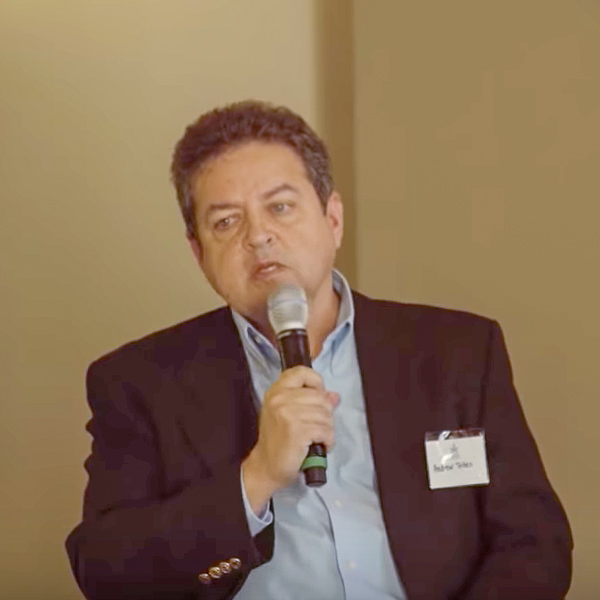Noise about whales and salmon is not sound science say scientists
“With fake science, as long as you repeat it often enough it takes on a life of its own,” – Dr. Andrew Trites, director of UBC’s Marine Mammal Research Unit
By Fabian Dawson
SeaWestNews
The noise made about the noise around the proposed increase in oil tanker traffic impacting killer whales and salmon in B.C. waters is not sound science, say two globally recognized marine wildlife experts.
The consequences of all this noisy activism is that the government will wind up making decisions that are based on false data, conclude Dr. Andrew Trites, the director of UBC’s Marine Mammal Research Unit (pictured) and Dr. Brian Riddell, president and CEO of the Pacific Salmon Foundation (PSF).
They were speaking at a recent presentation entitled The Truth about Orcas, Seals and Chinook in Vancouver that was organized by PSF and moderated by veteran TV reporter, Stu McNish.
“With fake science, as long as you repeat it often enough it takes on a life of its own,” said Dr. Trites, responding to claims that the seven-fold increase in tanker traffic as a result of the Kinder Morgan Trans-Mountain pipeline expansion project, will substantially amplify underwater noise and the risk of extinction to the orcas.
“It is interesting you know the public discussion on noise is focused on the increase on tanker traffic … the sevenfold increase that is projected.
“But you are never told when you hear a percentage increase like that…so what is the absolute number and that’s what people should be asking…What is the denominator?”
“We are going from my understanding from 2 vessels per week to 14, that’s an extra 12.”
Dr. Trites said no one raises the noise question when B.C. Ferries adds on between 80 and 115 extra sailings on long weekends, adding that B.C. Ferries is the “biggest noisemaker in the Salish Sea.”
“So if these groups truly cared about noise they would be saying, we want half as many sailings we want them to go twice as slow because we care about whales and this noise we just cannot stand it.
“Put a percentage on that…and so I find a lot of the discussions very hypocritical…It is not really getting at what the real issues are.
“So who is really making the noise here…Maybe we need to build a bridge to Vancouver Island, maybe we should ban all ferries if that is what you truly believe is the cause of the trouble,” he said.
On the issue of whales being struck by increased tanker traffic, Dr. Trites commented that, “it is BC Ferries you want to slow down.”
“But they (BC Ferries) watch all the time and they are extremely careful and we are not seeing it (strikes)…remember, killer whales are the largest dolphins…they are an urbanized whale and they’re used to being in and around vessels.
“It doesn’t mean they can’t be struck…it doesn’t mean they can’t be cut by propellers but in many cases the whales actually engage with vessels, wanting to ride their wakes, coming in very close to the prompts… the whales have adapted, but the public discussion is focused on the sevenfold (increase) and nobody is asking real absolute numbers.”
“People I have never heard of before are now experts spouting out opinions and there is so much mass confusion which has literally taken on a life of its own.
“I do not know what to do to correct that…We are now caught up in the world of fake science,” said Dr. Trites, who has been studying marine mammals in the North Pacific for over 30 years.
On the claims of wild salmon being adversely impacted by noise from increased ship traffic, Dr. Brian Riddell of the Pacific Salmon Foundation said “salmon are not very affected by noise.”
He said that if there is loud noise, fish will immediately move.
“But as soon as the noise stops you’re going to see them back and within a minute sort of thing, so they will shift and come back…so, I think noise on fish is not a huge issue.”
Dr. Riddell said the new tankers that are coming are very slow moving, bigger and highly controlled by pilots.
“The newer vessels are much, much less noisy than the older vessels,” adding he doesn’t believe there will be any net increase in noise in the Salish Sea.
“I am quite sure we are going to make great progress on the sound aspect, but the thing is definitely confused many times the way it is said.
“We are living in a world where people believe science to be beliefs and opinions and dismiss it as that and that is very disturbing.
“False information out there is a very serious communication issue right now and one of the reasons we need to keep on education,” said Dr. Riddell, who worked for 30 years in various scientific research and management positions with Canada’s Department of Fisheries and Oceans.
RELATED STORIES
A time to cull seals and sea lies
Whale of a whopper by anti-fish farm activists
First Nations author warns of paid “puppets and props” used to plug resource projects in Canada.

